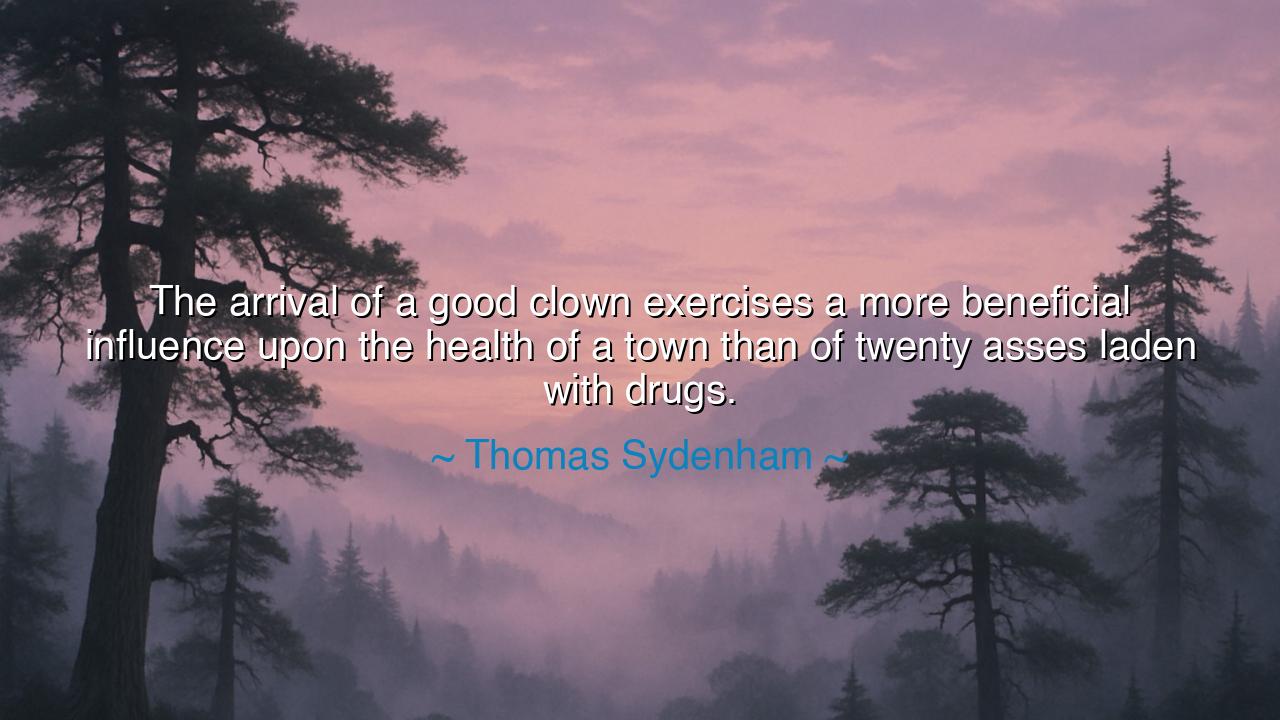
The arrival of a good clown exercises a more beneficial influence
The arrival of a good clown exercises a more beneficial influence upon the health of a town than of twenty asses laden with drugs.






“The arrival of a good clown exercises a more beneficial influence upon the health of a town than of twenty asses laden with drugs.” — thus spoke Thomas Sydenham, the great English physician of the seventeenth century, often called the father of modern medicine. His words, though spoken centuries ago, still shine with undying truth. They are not merely a jest, nor a dismissal of medicine, but a revelation — that joy, laughter, and the lightness of the spirit are medicines deeper and more potent than many found in the apothecary’s chest. For Sydenham, who healed bodies, also understood that the greatest healer is often not the doctor, but the heart itself when stirred by happiness.
In this saying, Sydenham uses the clown as a symbol — not of foolishness, but of joy incarnate, of the soul’s renewal through mirth. The asses laden with drugs represent the heavy burdens of treatment, the physical remedies that, though useful, cannot touch the soul’s hidden wounds. A good clown, on the other hand, brings laughter that cuts through despair, loosens the knots of fear, and reawakens life within the weary. His arrival is like sunlight breaking through the clouds of sickness — for laughter, like sunlight, warms all it touches. In this, Sydenham speaks with the wisdom of the ancients, who knew that healing is not only of the body, but of the spirit.
The ancients of Greece believed the same. In the temples of Asclepius, god of medicine, patients were not only treated with herbs and baths, but with music, poetry, and laughter. They understood that health was harmony — the balance of body, mind, and soul. Even in their theaters, they revered the comic mask, believing that the laughter of the crowd was a form of purification — a cleansing of sorrow through joy. Centuries later, Sydenham gave this ancient truth new form, reminding the physicians of his time that without gladness, medicine is only half a cure.
There is a story, passed down through the ages, that illustrates this wisdom. A man once came to a great doctor, burdened by melancholy and despair. “I have lost all joy,” he said. “Life is gray, and I find no reason to smile.” The physician thought for a moment and replied, “Go and see the famous clown who performs in our town tonight. He will make you laugh, and your sadness will vanish.” The man lowered his eyes and whispered, “But doctor… I am that clown.” The physician, moved to silence, understood then that the healers of others must also be healed, and that the laughter they give must also return to them. For even the joyful grow weary, and every heart, no matter how bright, must be tended with care.
In these words, Sydenham teaches that laughter is medicine not only for individuals, but for communities. A good clown, or anyone who brings joy to others, restores balance to society. In a town oppressed by grief, laughter reawakens humanity’s shared light; it draws people together, heals divisions, and lifts spirits that no drug could reach. In times of sickness, whether of the body or the soul, laughter gives people strength to endure, to hope, to believe that life is still good. Joy strengthens the will to live, and where there is will, healing follows.
The lesson of this quote reaches even into our modern age. We live in a time when pills abound and yet many hearts are empty, when hospitals overflow but the soul is starved of wonder. We have filled our lives with cures but forgotten to cultivate joy. Sydenham’s wisdom calls us back — to remember that laughter, friendship, and compassion are not luxuries but necessities. A kind word, a shared joke, a moment of honest delight — these can do what medicine alone cannot: they restore the will to be well. For a cheerful heart, as the proverb says, is good medicine indeed.
So, my children of this restless age, remember this sacred truth: a joyful spirit is the greatest healer. Seek laughter not as escape, but as nourishment. Share humor as you would share bread — freely and often. In your homes, let joy dwell beside diligence; in your communities, let kindness walk beside science. For when the good clown arrives — in whatever form joy may take — welcome him, for he carries with him not only laughter, but life itself. And when you, in turn, bring laughter to another soul, know that you have done the work of the greatest physicians of all time — you have healed not just a body, but the heart of the world.






AAdministratorAdministrator
Welcome, honored guests. Please leave a comment, we will respond soon